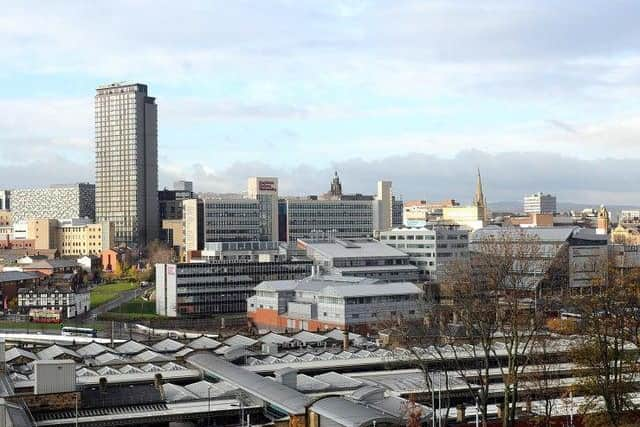Sheffield leaders halted clean air zone amid fears drivers would 'pay to pollute'
Sheffield City Council yesterday announced that it would be following Leeds' example by reviewing plans to bring in a clean air zone due to falling levels of pollution.
The Sheffield clean air zone, which would have been introduced in early 2021, would have seen fees of £10 per day for polluting LGVs and Taxis to enter the city centre as well as £50 per day for coaches, buses and HGVs.
Advertisement
Hide AdAdvertisement
Hide AdBut is now one of a number of similar projects which have been put on halt because a sharp fall in traffic on the roads has reduced pollution levels.
Labour-run Sheffield council says the situation had changed “significantly and unexpectedly” since its plans were first submitted to government in 2018 due to the global pandemic.
The city has seen a drop in air pollution of up to 33 per cent from January to August of this year compared to the same period in 2019 due to dramatic changes in the times and volume of travel of cities.
The council is also aware many businesses are struggling and says if it can “hold on” to clean air through other measures without resorting to charging people, it will.
Advertisement
Hide AdAdvertisement
Hide Ad

City leaders fear that charging people to enter the centre will not help bring pollution levels down and many will simply "pay to pollute".
Sheffield Liberal Democrats said they welcome the news as they had raised serious concerns about the scheme since it was first discussed in 2018.
But the Green Party said it was a missed opportunity to make a real difference to air pollution hot spots.
Centre for Cities’ Chief Executive, Andrew Carter, chief executive of the Centre for Cities think-tank, said: “The pandemic should remind us of the dangers of toxic air; there is a direct link between air pollution levels and Covid-19 death rates.
Advertisement
Hide AdAdvertisement
Hide Ad"Before lockdown we found that about one in 26 deaths in Sheffield were linked to air pollution and while levels are currently low, they will creep up again as we either get used to living with the virus or a vaccine becomes available.
“Clean air zones take time to implement so policy makers need to act now to ensure they’re ready for when pollution levels rise again.”
In a statement yesterday, Bob Johnson, the Labour-run council's Cabinet Member for Transport and Development, said it was looking at alternative measures including incentives for upgrading vehicles, better provision for walking and cycling, and cleaner public transport.
He said that many of the businesses who will need to upgrade their vehicles in order to be compliant with the CAZ are focusing on controlling the spread of coronavirus. He added: "If they cannot afford to upgrade to cleaner vehicles, they may end up paying to pollute and we will all still breathe dirty air.
Advertisement
Hide AdAdvertisement
Hide Ad“With the right clean air plan and crucially, with the right funding from the Government, we can reduce pollution in a fair way, and in a way that is aligned with our zero-carbon goals."
And Louise Haigh, a Labour MP in Sheffield, said a lack of funding from government for local businesses to help them upgrade to cleaner vehicles had contributed to the decision to review the scheme.
She said: "Air pollution is an issue that needs to be urgently tackled, which causes tens of thousands of premature deaths every year, especially in the most deprived parts of our city and country. This cannot be allowed to continue and Sheffield is already one of the most polluted cities in the country.
"The Council was ready to get going with a Clean Air Zone in order to help tackle this serious problem. This had been supported by the people of Sheffield and many of the businesses it would affect because we all agree we want cleaner air.
Advertisement
Hide AdAdvertisement
Hide Ad"It is desperately disappointing that this cannot now go ahead because the government has failed to provide the funding necessary to support it and I will be working with the Council to make sure that it can be reintroduced as soon as possible."
A government spokesman said that while levels of harmful nitrogen dioxide (NO2) fell across the UK during lockdown, they are rising again in many places as traffic levels increase.
He said: “Interventions such as Clean Air Zones should be delivered as soon as possible, as they are essential to improving our future air quality and public health.
“Sheffield and Rotherham have received £7 million from the government to implement their plan and have also been awarded £20.4 million from the Clean Air Fund to mitigate the impacts of the Clean Air Zone.”
Advertisement
Hide AdAdvertisement
Hide AdThe Government's analysis suggests that as restrictions have been lifted, traffic levels have risen to near normal levels and NO2 levels have risen with them, although at a slower rate.
Emissions may also improve more slowly than previously expected, with less use of public transport, slower fleet renewal and more private car journeys, especially now schools have returned.
Comment Guidelines
National World encourages reader discussion on our stories. User feedback, insights and back-and-forth exchanges add a rich layer of context to reporting. Please review our Community Guidelines before commenting.